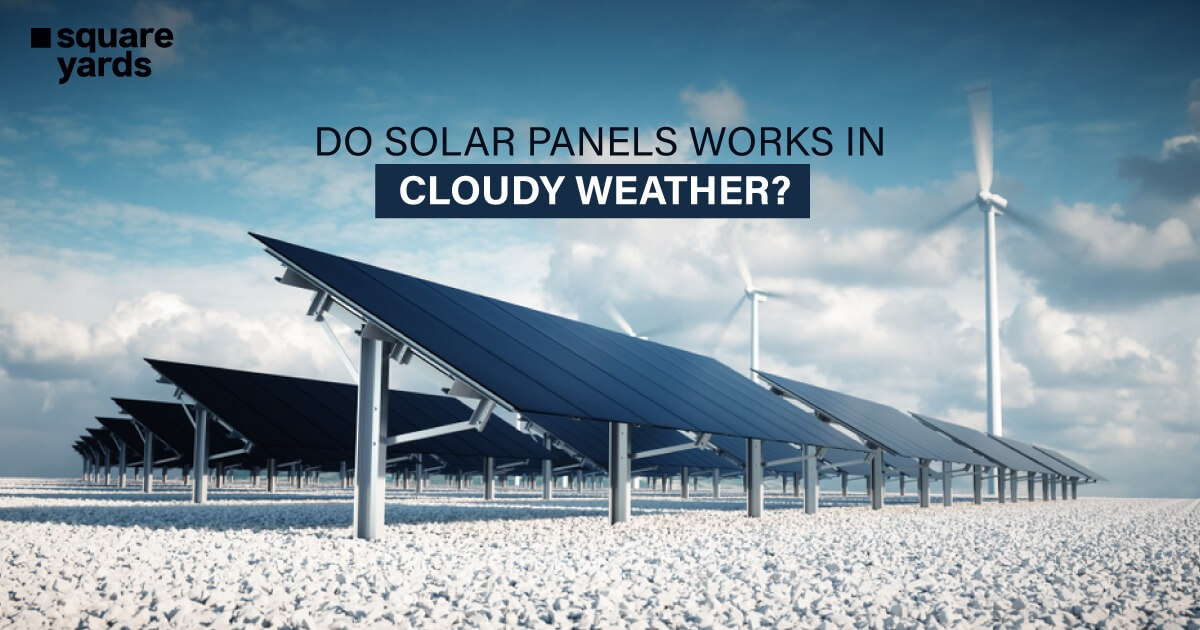It is obvious to have is some confusion about whether a solar solution can operate without sunlight or in intense cloudy weather. Although, we have got you back to assist you regarding the actual mechanism. Below, you will find the facts about how a solar energy solution works and whether it is a good deal to crack for residential or commercial spaces.
Table of contents
What are Solar Panels?
One of science’s major innovations in renewable energy production is solar panels. When commercial or residential buildings switch to solar energy solutions, installation costs are generally quite high. But before this, the owners must meet several criteria for installing solar rooftop solutions. However, this inculcation’s final outcome is impressive: it needs no financial input for consecutive purposes such as maintenance.
Do you ever wonder what happens to a business owner’s solar production on a cloudy day? If the answer is yes, you are undoubtedly not alone. To your question: Yes, solar panels function on overcast days but comparatively less than on sunny days.
In addition, cities with foggy and rainy weather continue to be the most common locations for solar panel installations, despite what solar sceptics claim. The price of electricity, not the amount, is the key indicator for the widespread adoption of rooftop solar in India. Even though most cities don’t get year-round sunshine, people nonetheless choose to live there since it lowers their utility costs. Famous hilly cities with clouds have solar panel systems because they have long summer days and comfortable temperatures, which are great for maximising solar output.
How do Solar Panels Work?
Solar panels convert light into energy by absorbing it. The solar panels’ photovoltaic (PV) cells absorb sunlight when it shines on them, aiding in generating electrical current. A rooftop solar in India or elsewhere is one where the solar panels are installed on top of residential or commercial space.
Do Solar Panels Work in Cloudy Weather?
Undoubtedly, the volume of electricity generated depends on conditions like solar panels’ quality and weather conditions. Some solar rooftop solutions can effectively absorb both types of wavelengths- the red and blue of the solar spectrum. The reason behind this is they function properly in reflected light. It enables them to produce more energy even on cloudy days. According to a reliable source, solar panels can still function at 80% of their maximum power. It takes many small yet dense clouds to obscure the sun and block its rays. And if you’ve observed, you may still become burnt on overcast or partly sunny days, proving that the sun’s intense energy can still pass through clouds.
When Do Solar Panels Work the Best?
Solar panels generate between 40 and 60 per cent less electricity in December and January than in July and August. As a result, solar energy production is considerably lower in winter than in summer. The major reason behind this was its absorption opportunities that are more on a sunny day than cloudy weather. To understand the concept, the higher the rays of sunlight are, the more electricity will be generated. Hence, if in cloudy weather, the sunlight is minimum, then the energy production will be lower than its actual calibre. Thus, it is said that solar panels make the best outcome when exposed to bright sunlight to work properly.
How Do Solar Panels Work in Cloudy Weather or at Night?
The cloudy weather or night does not bother solar panels to operating. Maintaining a substitute solar solution works because of the following reasons:
Solar Battery Backup
Solar energy solutions have the best method of storing solar energy that can be utilised during sunlight’s absence. Even if you have an on-grid solar solution installed at home, you will still be able to get electricity, as the panels produce more power than needed. That means no light disturbance can be witnessed even if the weather is cloudy or at night.
Net Metering
One might get saved with the net metering system if solar energy solutions have no backup system. This is the method where the extra electricity is produced to send to the electricity grid, also known as the utility grid. This also grants the consumers useful credits. These credits then get utilised later when there is an issue of cloudy weather or at night as an offset electricity cost. Net metering is the box of storage that keeps energy generation economic and accountable. This also acts well to dismiss expensive electricity bills and solar solutions and adds utility’s glory.
End Thoughts
We have understood the system that helps solar solutions operate effectively without the sun. Also, we have seen the secrets behind scientific operations. Hopefully, the potential consumers are all set to analyse whether a solar energy system is their cup of tea for the objectives with our descriptive and credible pieces of information.
Frequently Asked Questions (FAQ)
Do solar solutions operate well for residential?
Yes, solar solutions can effectively operate for houses and commercial buildings easily.
Is it necessary for solar solutions to have a backup?
Even without a backup, a solar rooftop system can operate on the net meter without the sun.
Should solar panels be installed only on the rooftop?
Yes, the rooftop exposure helps the solar solutions to work with complete efficiency and produce energy in huge quantities.

























